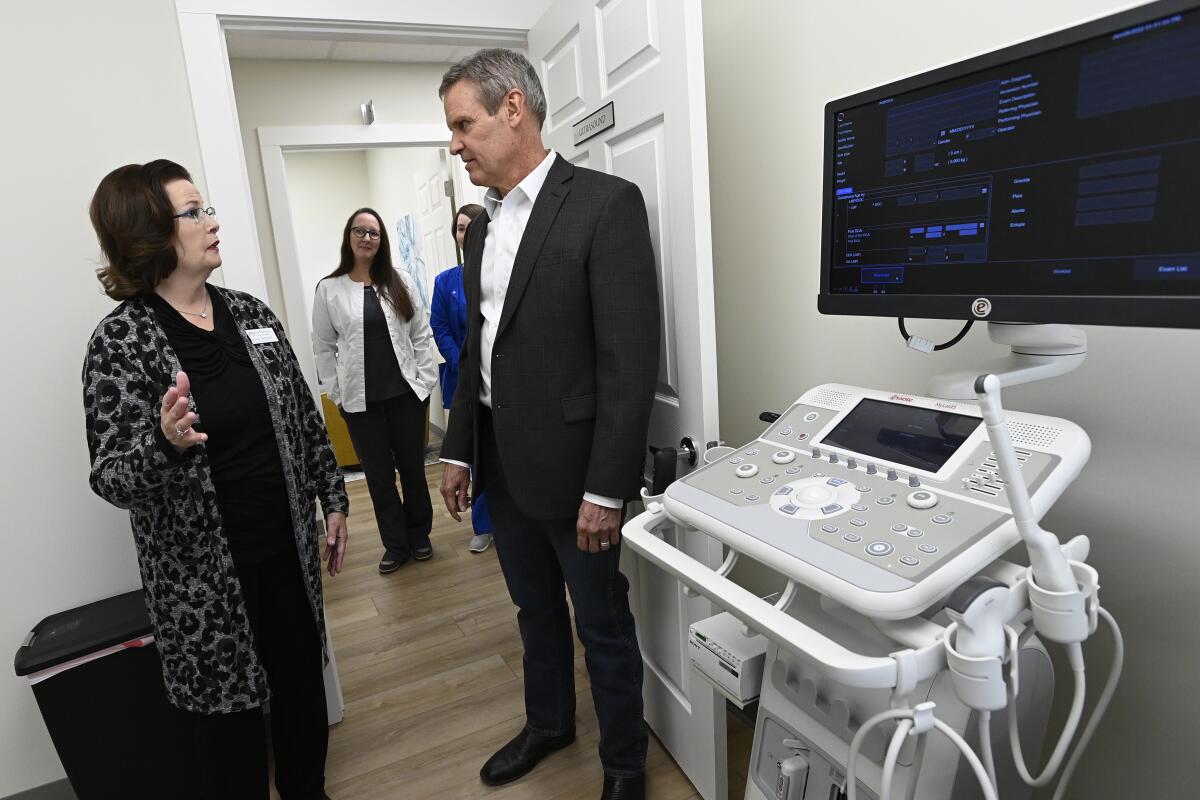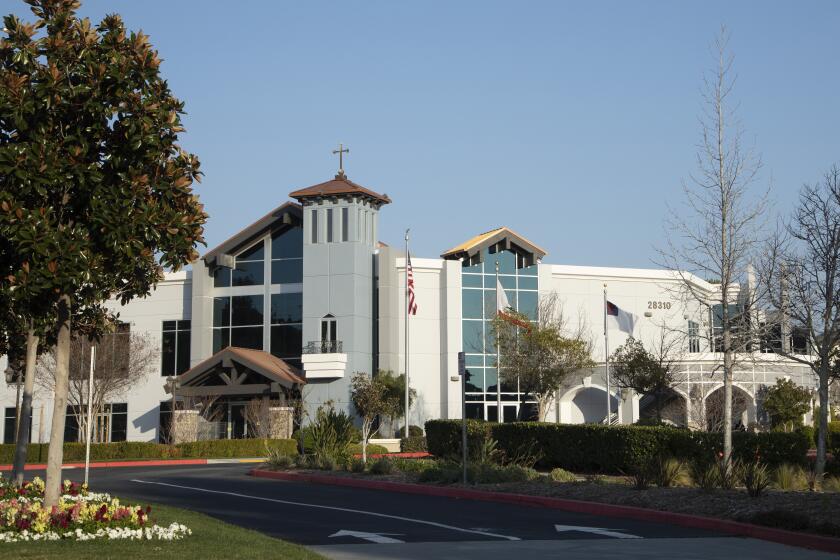Millions in tax dollars flow to antiabortion centers in U.S.

- Share via
NASHVILLE — Anti-abortion centers across the country are receiving tens of millions of tax dollars to talk women out of ending their pregnancies, a nearly fivefold increase from a decade ago that resulted from an often-overlooked effort by mostly Republican-led states.
The nonprofits known as crisis pregnancy centers are typically religiously affiliated and counsel clients against having an abortion as part of their free but limited services. That practice and the fact that they generally are not licensed as medical facilities have raised questions about whether it’s appropriate to funnel so much tax money their way.
An Associated Press tally based on state budget figures reveals that nearly $89 million has been allocated to such centers across about a dozen states this fiscal year. A decade ago, the annual funding for the programs hovered around $17 million in about eight states.
Estimates of how many abortions have been prevented by such programs are unknown because many states only require reports of how many clients were served. Trying to pinpoint exactly how many pregnancy centers receive taxpayer dollars also is difficult because each state has a different system to distribute the money.
“It’s bad governing. We’re supposed to be monitoring our taxpayer money and we don’t know where the money is going,” said Julie von Haefen, a Democratic state representative in North Carolina, which has sent millions in public money to pregnancy centers. “These clinics don’t provide medical care. They act like they do, but they don’t.”
During the pandemic a few schools have repeatedly thwarted L.A. County health inspectors from accessing their facilities, bringing on citations and fines.
What is clear is that taxpayer funding for the centers has spiked in recent years as more Republican-led states have passed legislation severely limiting access to abortion.
The centers have also been accused of providing misleading information about abortion and contraception — for example, suggesting that abortion leads to mental health problems or breast cancer.
Supporters hope to expand the number of centers if the U.S. Supreme Court overturns or significantly restricts abortion rights in a case to be decided later this year.
That momentum is already building in Texas, where a state law that effectively bans abortion at about six weeks — before many women know they are pregnant — has been in effect since September.
“We have seen women still steadily seeking out resources and services,” said Chelsey Youman, Texas state director and national legislative advisor for Human Coalition, a top contractor under the state’s alternatives-to-abortion program. “Women are saying, ‘All right, abortion isn’t available after my child has a heartbeat, so what is out here?’”
The new law, Youman said, has helped refocus the crisis pregnancy centers’ efforts on both women who have accepted the new restrictions and need help, as well as those who are wavering on whether to cross state lines to get an abortion.
Most centers offer pregnancy tests and pregnancy-related counseling. Some also offer limited medical services such as ultrasounds.
Last year, Tennessee lawmakers allocated money for several ultrasound machines to be placed in pregnancy centers. At a recent dedication of an ultrasound machine about 30 miles south of Nashville, Republican Gov. Bill Lee said the state-funded purchase was critical in swaying patients who were considering the procedure.
The first state to enact an official abortion-alternatives program was Pennsylvania in the mid-1990s.
Then-Gov. Robert P. Casey, an anti-abortion Democrat, signed the crisis pregnancy center funding into law, barely a year after his administration fought to the Supreme Court to win a landmark 1991 ruling allowing states to impose restrictions on abortion.
Under the deal, Pennsylvania began subsidizing the program to appease opponents of a preexisting program that subsidized Planned Parenthood’s services for women’s health. Republican majorities in the Legislature have renewed the agreement ever since.
If money for the program were cut from the budget, “then we would ax that line item that goes to Planned Parenthood, as well,” said state Rep. Kathy Rapp, a Republican who chairs the health committee in the House.
The Pennsylvania Health Department has contracted with a nonprofit known as Real Alternatives to oversee the program and distribute money. The Pennsylvania-based group eventually was selected to oversee similar programs in Michigan and Indiana.
The Campaign for Accountability, a Washington-based watchdog organization, has launched multiple complaints against Real Alternatives, including allegations that the group failed to meet its own goals and misspent taxpayer money.
Pennsylvania Auditor General Eugene DePasquale declared in 2017 that a lack of government oversight allowed Real Alternatives for decades to use tax dollars to expand its work in other states. The state instructed the group to change the way it pays subcontractors when its contract was renewed.
In Michigan, Gov. Gretchen Whitmer vetoed the state’s annual $700,000 budget for abortion alternatives in 2019 following a complaint that Real Alternatives failed to provide services to the number of women promised in its contract.
While multiple states have funded crisis pregnancy centers for years, no state has acted as ambitiously as Texas.
In 2005, Texas created its own program with $5 million taken from its federal welfare dollars, allowing a variety of nonprofits to apply for grants. It quickly expanded under the Republican-controlled Legislature.
This year, Texas lawmakers dedicated a record $100 million to fund the project over the next two years.
State Rep. Debra Howard said that money could be better spent on state-supervised women’s health programs that offer annual exams, disease screenings and family planning services.
“The exponential increase in funding is unparalleled,” the Austin Democrat said. “It’s certainly not something we’ve seen for other programs that are in the category for women’s health.”
More to Read
Sign up for Essential California
The most important California stories and recommendations in your inbox every morning.
You may occasionally receive promotional content from the Los Angeles Times.














